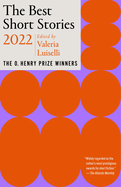
The O. Henry Prize has been awarded to short fiction since 1919. For The Best Short Stories 2022, guest editor Valeria Luiselli (Lost Children Archive) chose 20 stories, half of which happen to be in translation, that "straddle the familiar and the unfamiliar" and capture what she calls "a slice of the immediate present." The subjects of the stories include a lonely widower obsessed with domestic detail (Olga Tokarczuk's "Seams," translated by Jennifer Croft) and a Chicago teacher with an eccentric idea for connecting with a problem student (Shanteka Sigers's "A Way with Bea"). Chimamanda Ngozi Adichie and 'Pemi Aguda both focus on childbirth. Fable, magic realism, metafiction, sci-fi horror: the collection has it all.
Everyday threats and losses permeate these stories, with some themes recurring. Sexual misconduct--blatant or suspected--links several stories, such as Francisco González's "Clean Teen" and Samanta Schweblin's "An Unlucky Man," translated by Megan McDowell. In Joseph O'Neill's outstanding "Rainbows," a teenager's allegations cause her mother to reflect on how times have changed. The pandemic fueled four tales, among them Eshkol Nevo's "Lemonade," translated by Sondra Silverston, about an Israeli couple taking up amateur pornography to make ends meet, and Lorrie Moore's "Face Time," in which sisters interact with their hospitalized father via an iPad screen.
Closing interviews divulge the authors' inspirations. Unusual touches include first-person plural narration and a Spanish-language nursery rhyme template in Yohanca Delgado's "The Little Widow from the Capital." Best of all is Vladimir Sorokin's "Horse Soup," translated by Max Lawton, which is about a woman's relationship with a food-fixated ex-prisoner she meets on a train: surreal as a Kafkaesque novella. --Rebecca Foster, freelance reviewer, proofreader and blogger at Bookish Beck

